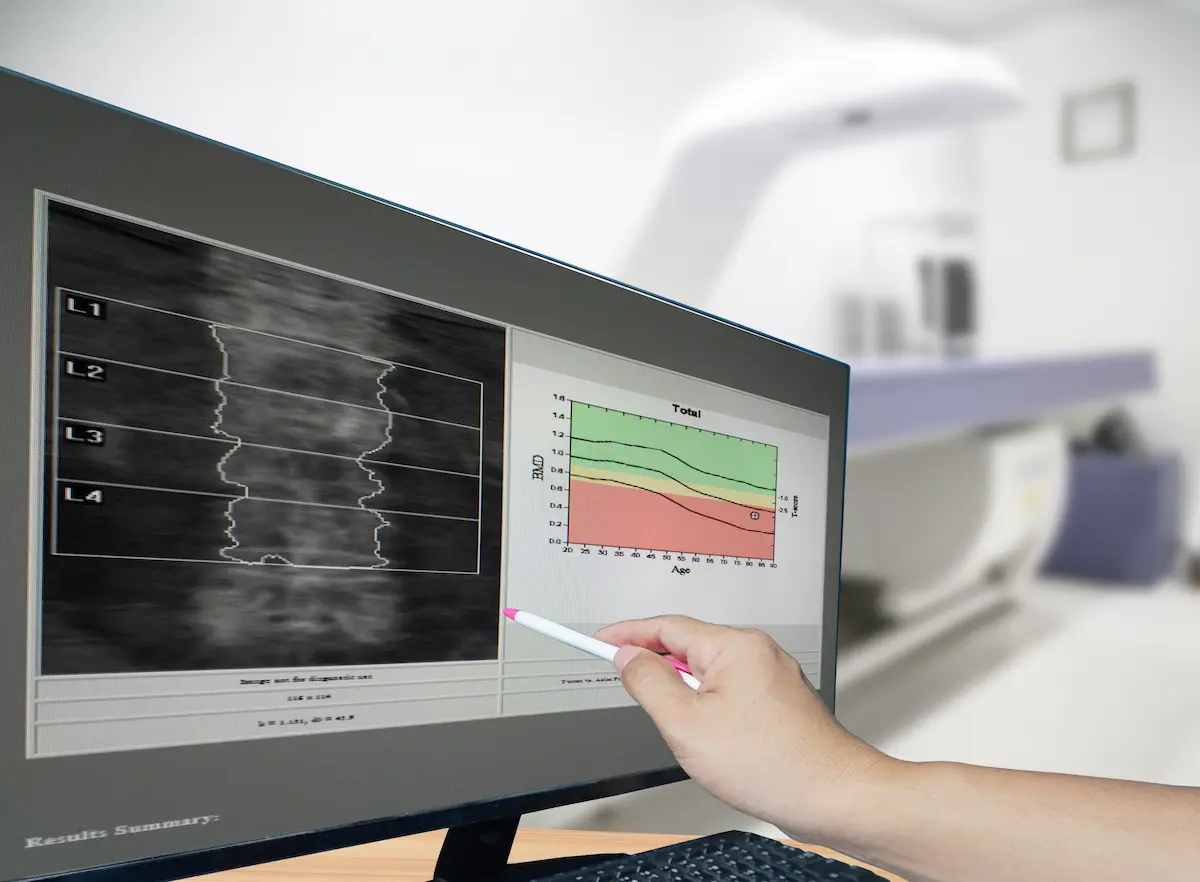Does a Bone Density Test Show Cancer? Understanding Bone Health

As women age, maintaining strong and healthy bones becomes increasingly important. Bone density tests are a valuable tool for assessing bone health and detecting conditions like osteoporosis. But can a bone density test also reveal cancer?
This comprehensive guide will answer that question and explore the significance of bone density testing for women aged 65 and older in Miami. We’ll also delve into related topics like DEXA scans, T-scores, and where to get tested in Miami, empowering you to take proactive steps towards optimal bone health.
Does a Bone Density Test Show Cancer? Clarifying Its Purpose
While a bone density test is not primarily designed to detect cancer, it can sometimes reveal abnormalities that might suggest the presence of cancer or other bone diseases.
Can a DEXA Scan Show Cancer?
A DEXA scan (dual-energy X-ray absorptiometry) is the most common type of bone density test. It uses low-dose X-rays to measure bone mineral density. While its primary purpose is to assess bone health and diagnose osteoporosis, a DEXA scan can sometimes detect:
- Bone tumors: Abnormal growths in the bone that might be benign or cancerous.
- Metastatic bone cancer: Cancer that has spread to the bones from other parts of the body.
- Other bone diseases: Conditions like Paget’s disease of bone, which can weaken bones.
Understanding Your T-Score
A bone density test provides a T-score, which compares your bone density to that of a healthy young adult.
- Normal bone density: A T-score of -1.0 or above.
- Low bone density (osteopenia): A T-score between -1.0 and -2.5.
- Osteoporosis: A T-score of -2.5 or below.
Where to Get a DEXA Scan in Miami
If you’re in Miami and need a bone density test, several options are available:
- Hospitals: Many hospitals in Miami offer DEXA scans.
- Imaging centers: Specialized imaging centers also provide bone density testing.
- Doctor’s offices: Some primary care offices might have DEXA scan capabilities.

Can I Drink Milk Before a Bone Density Test?
It’s generally recommended to avoid consuming calcium supplements or calcium-rich foods like milk for at least 24 hours before a bone density test. This is because calcium can interfere with the accuracy of the scan.
Bone Density Screening Guidelines: When to Get Tested
The National Osteoporosis Foundation recommends bone density screening for:
- Women aged 65 and older
- Younger postmenopausal women with risk factors for osteoporosis
Risk factors for osteoporosis include:
- Family history of osteoporosis
- Early menopause
- Low body weight
- Certain medications
- Smoking
- Excessive alcohol consumption
Primary Care Doctor and Bone Health in Miami
Your primary care doctor or primary doctor in Miami can play a crucial role in monitoring your bone health. They can:
- Assess your risk factors for osteoporosis.
- Recommend appropriate screening and testing.
- Provide guidance on maintaining strong bones and preventing bone loss.
- Refer you to specialists if needed.
Key Takeaways:
- While a bone density test primarily assesses bone health, it can sometimes reveal signs of cancer or other bone diseases.
- A DEXA scan is the most common type of bone density test.
- Understanding your T-score is important for assessing your bone health.
- If you’re in Miami and need a bone density test, consult your primary care doctor or a specialist.
Remember, this article is intended for informational purposes only and should not be considered a substitute for professional medical advice. If you have any concerns about your bone health or the results of a bone density test, consult a qualified healthcare professional.
FAQs: Does a Bone Density Test Show Cancer?
- If my bone density test shows something unusual, does that automatically mean I have cancer? Not necessarily. While a bone density test can sometimes reveal abnormalities that might suggest cancer, it’s not a definitive diagnostic tool for cancer. Other conditions like benign bone tumors or osteoporosis can also cause abnormalities on a bone density scan. If your doctor in Miami sees something concerning on your scan, they will likely recommend further testing, such as X-rays or a bone biopsy, to determine the cause.
- Can a bone density test detect other health problems besides osteoporosis and cancer? Yes, it can sometimes reveal other bone-related conditions like osteomalacia (softening of the bones) or Paget’s disease of bone (abnormal bone remodeling).
- I’m taking calcium supplements. Do I need to stop taking them before my bone density test? Yes, it’s generally recommended to avoid calcium supplements for at least 24 hours before a bone density test, as calcium can interfere with the accuracy of the scan. Talk to your doctor in Miami about any medications or supplements you’re taking before your test.
- How often should I get a bone density test? The recommended frequency depends on your age, risk factors, and previous bone density results. For women over 65 in Miami, a baseline bone density test is generally recommended, with follow-up scans every few years or as advised by your doctor.
- I’m concerned about my bone health. How can I find a primary care doctor in Miami to discuss my concerns? You can search online for “primary care doctor near me in Miami” or ask for recommendations from friends, family, or your insurance provider. Consider scheduling a consultation with Hiriart & Lopez MD in Miami to discuss your bone health and receive personalized guidance.
Contact Us
Hiriart & Lopez MD, LLC
9950 SW 107th Ave STE 101,
Miami, FL 33176
305-274-8779
Phone: (305) 274-8779
Fax: (305) 274-0646
OPENING HOURS
Monday 7:30 AM–4:30 PM
Tuesday 7:30 AM–4:30 PM
Wednesday 7:30 AM–4:30 PM
Thursday 7:30 AM–4:30 PM
Friday 7:30–11 AM
Saturday Closed
Sunday Closed
OFFICE LOCATION
Does a Bone Density Test Show Cancer? Understanding Bone Health

As women age, maintaining strong and healthy bones becomes increasingly important. Bone density tests are a valuable tool for assessing bone health and detecting conditions like osteoporosis. But can a bone density test also reveal cancer?
This comprehensive guide will answer that question and explore the significance of bone density testing for women aged 65 and older in Miami. We’ll also delve into related topics like DEXA scans, T-scores, and where to get tested in Miami, empowering you to take proactive steps towards optimal bone health.
Does a Bone Density Test Show Cancer? Clarifying Its Purpose
While a bone density test is not primarily designed to detect cancer, it can sometimes reveal abnormalities that might suggest the presence of cancer or other bone diseases.
Can a DEXA Scan Show Cancer?
A DEXA scan (dual-energy X-ray absorptiometry) is the most common type of bone density test. It uses low-dose X-rays to measure bone mineral density. While its primary purpose is to assess bone health and diagnose osteoporosis, a DEXA scan can sometimes detect:
- Bone tumors: Abnormal growths in the bone that might be benign or cancerous.
- Metastatic bone cancer: Cancer that has spread to the bones from other parts of the body.
- Other bone diseases: Conditions like Paget’s disease of bone, which can weaken bones.
Understanding Your T-Score
A bone density test provides a T-score, which compares your bone density to that of a healthy young adult.
- Normal bone density: A T-score of -1.0 or above.
- Low bone density (osteopenia): A T-score between -1.0 and -2.5.
- Osteoporosis: A T-score of -2.5 or below.
Where to Get a DEXA Scan in Miami
If you’re in Miami and need a bone density test, several options are available:
- Hospitals: Many hospitals in Miami offer DEXA scans.
- Imaging centers: Specialized imaging centers also provide bone density testing.
- Doctor’s offices: Some primary care offices might have DEXA scan capabilities.

Can I Drink Milk Before a Bone Density Test?
It’s generally recommended to avoid consuming calcium supplements or calcium-rich foods like milk for at least 24 hours before a bone density test. This is because calcium can interfere with the accuracy of the scan.
Bone Density Screening Guidelines: When to Get Tested
The National Osteoporosis Foundation recommends bone density screening for:
- Women aged 65 and older
- Younger postmenopausal women with risk factors for osteoporosis
Risk factors for osteoporosis include:
- Family history of osteoporosis
- Early menopause
- Low body weight
- Certain medications
- Smoking
- Excessive alcohol consumption
Primary Care Doctor and Bone Health in Miami
Your primary care doctor or primary doctor in Miami can play a crucial role in monitoring your bone health. They can:
- Assess your risk factors for osteoporosis.
- Recommend appropriate screening and testing.
- Provide guidance on maintaining strong bones and preventing bone loss.
- Refer you to specialists if needed.
Key Takeaways:
- While a bone density test primarily assesses bone health, it can sometimes reveal signs of cancer or other bone diseases.
- A DEXA scan is the most common type of bone density test.
- Understanding your T-score is important for assessing your bone health.
- If you’re in Miami and need a bone density test, consult your primary care doctor or a specialist.
Remember, this article is intended for informational purposes only and should not be considered a substitute for professional medical advice. If you have any concerns about your bone health or the results of a bone density test, consult a qualified healthcare professional.
FAQs: Does a Bone Density Test Show Cancer?
- If my bone density test shows something unusual, does that automatically mean I have cancer? Not necessarily. While a bone density test can sometimes reveal abnormalities that might suggest cancer, it’s not a definitive diagnostic tool for cancer. Other conditions like benign bone tumors or osteoporosis can also cause abnormalities on a bone density scan. If your doctor in Miami sees something concerning on your scan, they will likely recommend further testing, such as X-rays or a bone biopsy, to determine the cause.
- Can a bone density test detect other health problems besides osteoporosis and cancer? Yes, it can sometimes reveal other bone-related conditions like osteomalacia (softening of the bones) or Paget’s disease of bone (abnormal bone remodeling).
- I’m taking calcium supplements. Do I need to stop taking them before my bone density test? Yes, it’s generally recommended to avoid calcium supplements for at least 24 hours before a bone density test, as calcium can interfere with the accuracy of the scan. Talk to your doctor in Miami about any medications or supplements you’re taking before your test.
- How often should I get a bone density test? The recommended frequency depends on your age, risk factors, and previous bone density results. For women over 65 in Miami, a baseline bone density test is generally recommended, with follow-up scans every few years or as advised by your doctor.
- I’m concerned about my bone health. How can I find a primary care doctor in Miami to discuss my concerns? You can search online for “primary care doctor near me in Miami” or ask for recommendations from friends, family, or your insurance provider. Consider scheduling a consultation with Hiriart & Lopez MD in Miami to discuss your bone health and receive personalized guidance.
Contact Us
Hiriart & Lopez MD, LLC
9950 SW 107th Ave STE 101,
Miami, FL 33176
305-274-8779
Phone: (305) 274-8779
Fax: (305) 274-0646
OPENING HOURS
Monday 7:30 AM–4:30 PM
Tuesday 7:30 AM–4:30 PM
Wednesday 7:30 AM–4:30 PM
Thursday 7:30 AM–4:30 PM
Friday 7:30–11 AM
Saturday Closed
Sunday Closed

